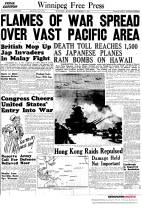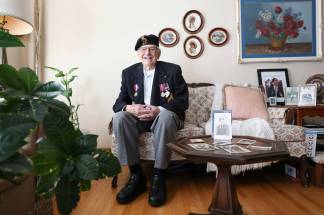A duty to serve Centenarian vets remain humble about roles in Second World War
Read this article for free:
or
Already have an account? Log in here »
To continue reading, please subscribe:
Monthly Digital Subscription
$0 for the first 4 weeks*
- Enjoy unlimited reading on winnipegfreepress.com
- Read the E-Edition, our digital replica newspaper
- Access News Break, our award-winning app
- Play interactive puzzles
*No charge for 4 weeks then price increases to the regular rate of $19.00 plus GST every four weeks. Offer available to new and qualified returning subscribers only. Cancel any time.
Monthly Digital Subscription
$4.75/week*
- Enjoy unlimited reading on winnipegfreepress.com
- Read the E-Edition, our digital replica newspaper
- Access News Break, our award-winning app
- Play interactive puzzles
*Billed as $19 plus GST every four weeks. Cancel any time.
To continue reading, please subscribe:
Add Free Press access to your Brandon Sun subscription for only an additional
$1 for the first 4 weeks*
*Your next subscription payment will increase by $1.00 and you will be charged $16.99 plus GST for four weeks. After four weeks, your payment will increase to $23.99 plus GST every four weeks.
Read unlimited articles for free today:
or
Already have an account? Log in here »
Hey there, time traveller!
This article was published 04/11/2022 (1136 days ago), so information in it may no longer be current.
Despite the fact they have never met, Jean Poirier and Jim Magill have a great deal in common.
For starters, both moved to Winnipeg in their late teens, Poirier from Lorette, where he was one of 12 siblings, and Magill from Saskatoon, where he grew up the eldest of four. Magill, a retired Canadian National Railway employee, was married to his wife Evelyn — “a real peach,” he calls her — for 61 years before her death in 2010. Poirier, who ran his own electric services business until the early 1980s, and his wife Flora have been together for 65 years, having tied the knot in 1957.
RUTH BONNEVILLE / WINNIPEG FREE PRESS Poirier’s photo at the start of war.
Furthermore, not only did each man serve during the Second World War — Magill as a bombardier with the Royal Canadian Air Force and Poirier as a soldier with the Second Division of the First Canadian Army — they both toasted their centenary birthday earlier this year. Poirier turned 100 in January, with Magill following suit in July. (The latter breaks into a smile, mentioning the Patsy Cline impersonator his children hired for the occasion, the late country artist being one of his favourite singers.)
Magill, whose younger brother Jack was also in the air force, waves his hand when the word “hero” is brought up in regards to his military career, saying there was nothing heroic in the least about doing one’s job. The government of France begs to differ. In April 2018, Magill was knighted by a French consul during an official ceremony for his role in helping liberate France from Germany during the war.
Poirier plays down his role, too, stressing it was his duty to serve, nothing more. Besides, he says, when you’re 20 years old and haven’t seen much of the world, the prospect of going off to war presented itself as more of an adventure than some perilous undertaking.
Ahead of Remembrance Day, we sat down separately with Poirier and Magill to discuss their experiences overseas in the 1940s, which each remembers vividly. Here’s some of what they had to say.
Slipping into a navy blue, double-breasted suit jacket, Jean Poirier is pleased to discover the article of clothing still fits like a glove.
Poirier, a father of two and grandfather of five, typically dons the smart-looking blazer, which is adorned with a pair of service medals, only once a year, for a Remembrance Day mass at Saints-Martyrs-Canadiens, the Windsor Park church he and his wife have been members of for decades. The gathering was canceled the last two years owing to COVID-19, so it had been a while since he last tried his jacket on.
RUTH BONNEVILLE / WINNIPEG FREE PRESS Jean Poirier with with his wife, Flo, of 65 years.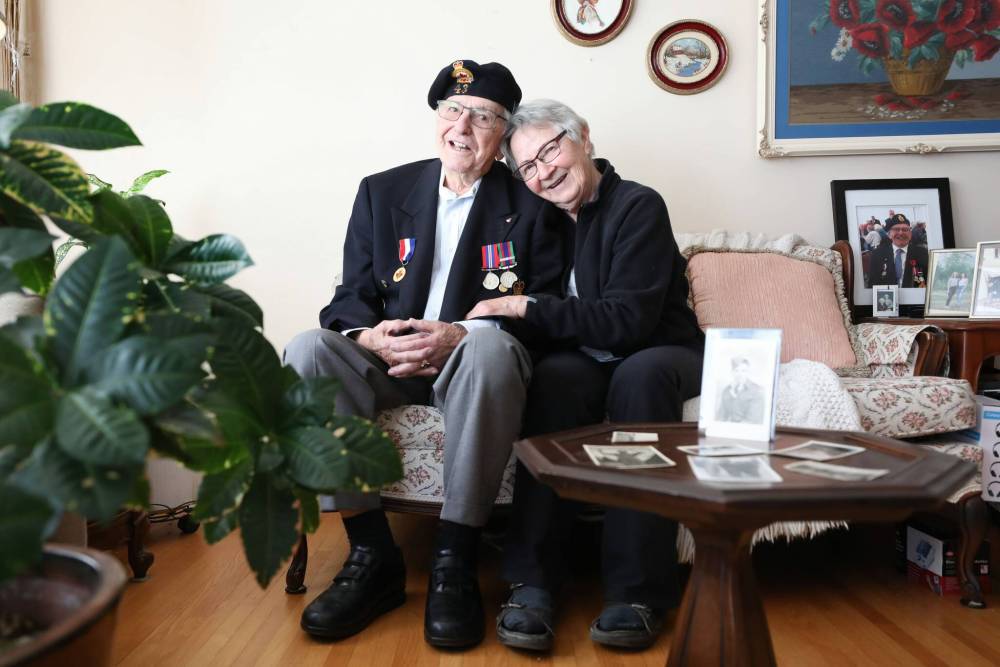
“Anyways, it’s a go this year and I’ll be laying a wreath at the church, the same way I did before the virus,” he says, seated in the living room of the tidily kept Niakwa Park bungalow he and Flora have called home since 1961. “I guess I should try and go for a walk or two before (Nov. 11) rolls around, to get in shape. What’s that saying? You’re not getting any younger? Isn’t that the truth.”
Poirier had just started a job as an electrician’s assistant in 1942 when he showed up at Fort Osborne Barracks South, renamed Kapyong Barracks in the 1960s, to volunteer his services. His younger brother Alfred, who lied about his age to enlist as a 17-year-old, was already in Europe by that time, and had sent numerous letters home, stating Jean was needed there, as well.
He was transferred to B.C. to perform his basic training at a facility near Boundary Bay, south of Vancouver. Unfortunately, he ended up in the hospital within a few months of his arrival, where he underwent a hydrocelectomy, a procedure meant to alleviate extreme swelling in (how can he put this gently?) a man’s nether region.
“I was in the hospital for three months, and from there they sent me to Harrison Hot Springs (in the Fraser Valley) to recuperate,” he continues. One evening, he was returning to his quarters after going for a bike ride when he was greeted by a ranking officer. “Pack your bags,” he was told, he was leaving for England in the morning.
RUTH BONNEVILLE / WINNIPEG FREE PRESS After a two-year pause due to COVID, Jean Poirier is again pulling out his double-breasted blue blazer to attend an upcoming Remembrance Day service.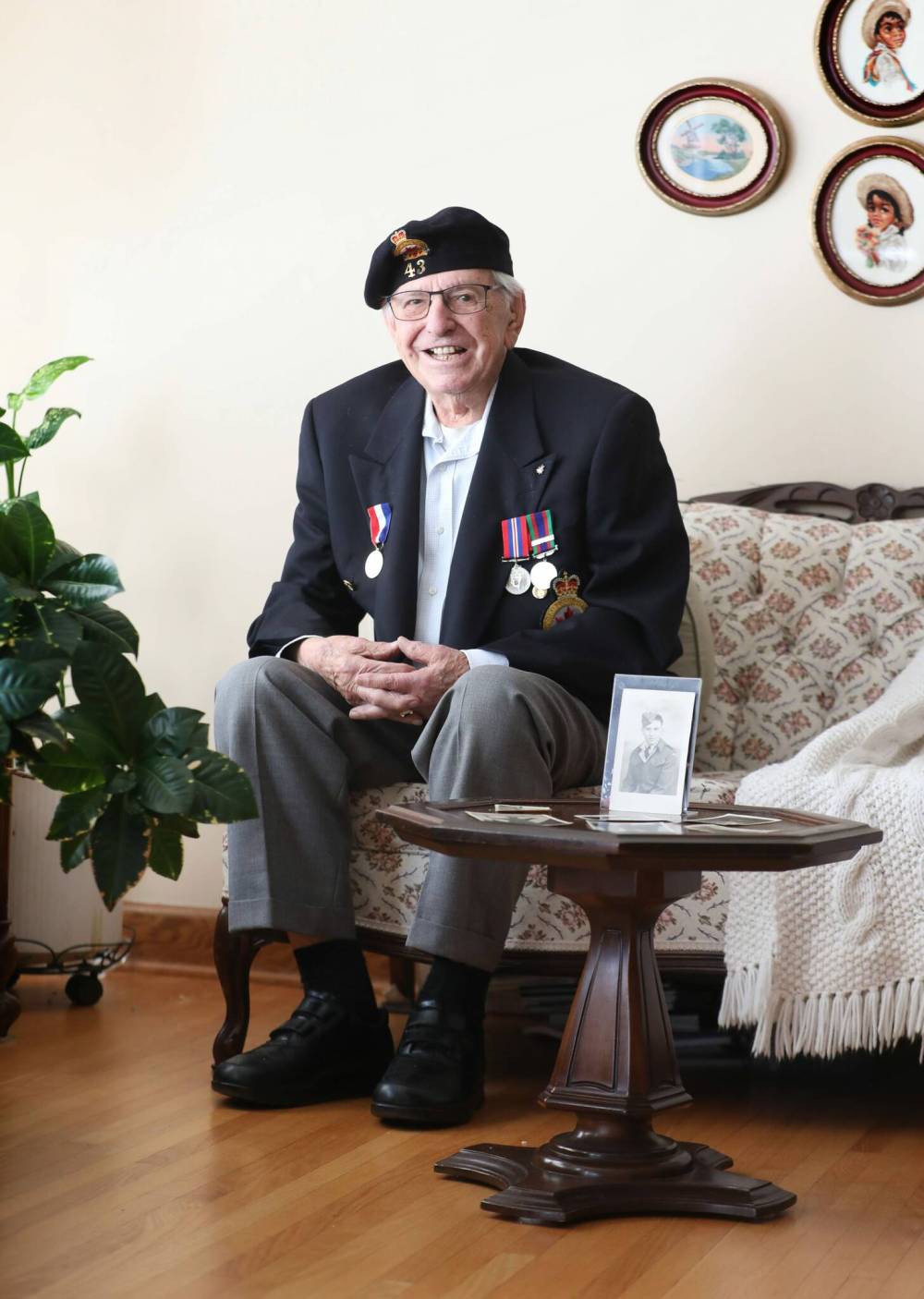
He did as he was instructed only there was a bit of a conundrum. Because he’d been convalescing from surgery, he hadn’t completed his full training. “What the hell good are you, then?” a commander wanted to know, when he reported to Aldershot Garrison, located about 50 kilometres from London.
“In any event, I did my basic and advanced (training) in England in what would have been the summer of ‘44,” he says, confirming with Flora that he has his dates correct.
In April 1945 Poirier, along with the rest of his unit, boarded a ferry bound for Belgium. After a brief engagement with the enemy, they made their way to Arnhem, a city in the eastern part of the Netherlands that had already been the site of several battles. They arrived at their destination on May 4, 1945. As luck would have it, the war ended four days later.
SUPPLIED Poirier (left) poses with fellow soldiers at the beginning of the war.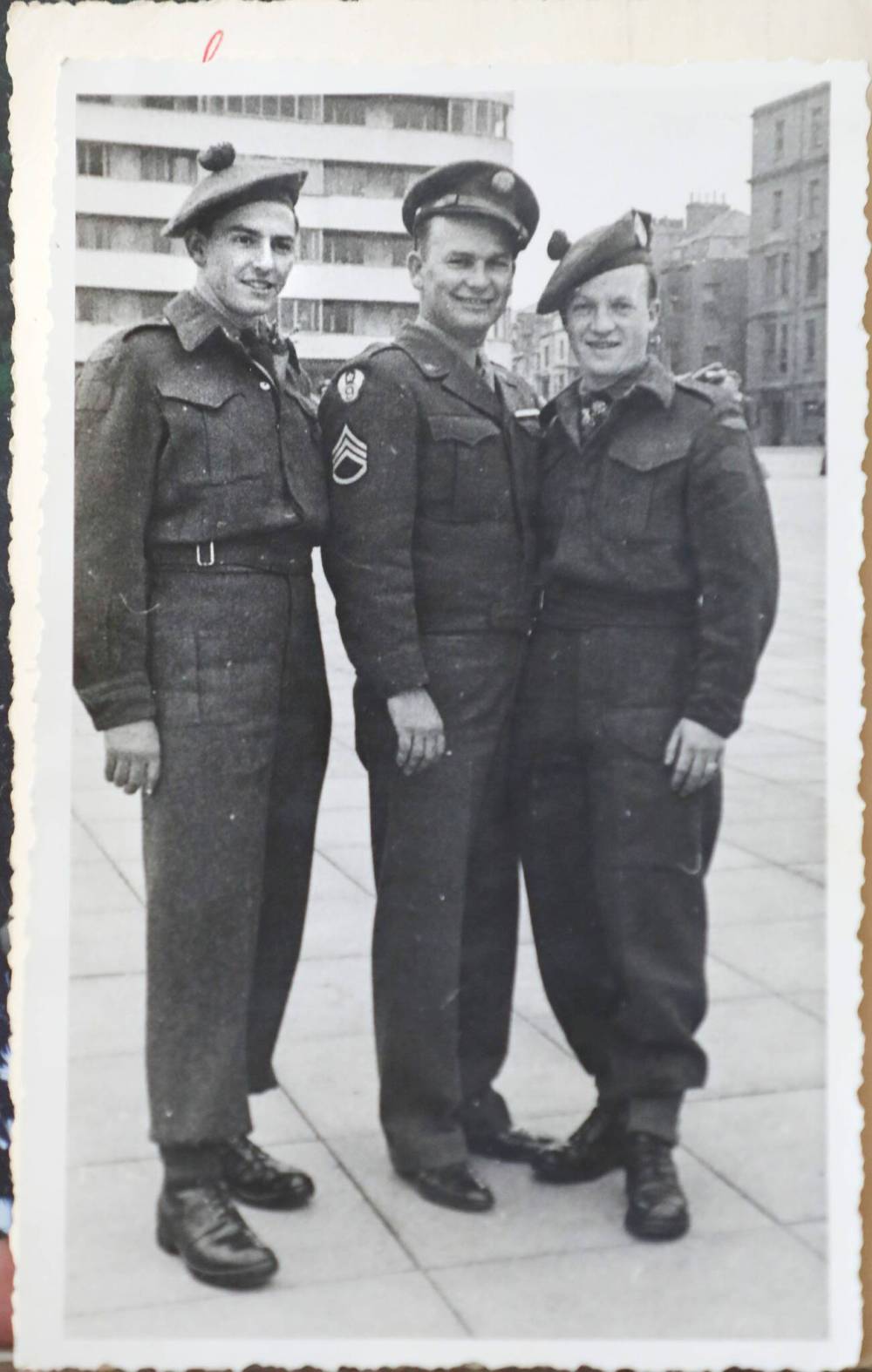
Instead of returning home immediately, he was tasked with traveling to Germany as part of the Canadian Army Occupation Force. Before that occurred, he needed to pay somebody a visit.
“My brother was about 100 miles from Arnhem, so I hitched a ride in an army truck, to get there,” he says, adding what he remembers most about that slow-moving, three-hour trip was the “hundreds upon hundreds” of German soldiers walking along the side of the road, making their way home on foot.
It was close to midnight when he was dropped off at the complex his brother was stationed at. Alfred was nowhere to be found — Poirier guessed he was out celebrating the end of the war — so he curled up on a mat in one corner of the room, to get some shuteye.
“Anyways, he comes in at around two in the morning and what does he do but trip right over me,” he says, laughing at the memory. “He gave me a god damn good kick, yelling ‘Who goes there?’ ‘Fred,’ I said, ‘it’s your brother, John. You told me to get my ass over here, and that’s just what I did.’”
Jim Magill had never so much as set foot in an airplane before volunteering for the Canadian air force at age 19.
The reason he chose that division was simple enough: he had heard through the grapevine that being a foot soldier involved a lot of slogging through muck, so better to choose what he wanted to do versus being called up and assigned “God knows where,” he says, seated in his one-bedroom suite, where he is joined by his daughter Tracy Schmidt and her husband Bob.
Assigned to a village outside Selby, in North Yorkshire, Magill was the lone “stupid Canuck” in a seven-man flight crew. “It was me, two Scotsmen, three Englishman and one Welshman. I was the bomb aimer, but was also trained as a pilot, navigator and wireless operator, in case there was an emergency, and I needed to take over from one of them.”
There were a fair number, he responds, when asked about any close calls. One evening, they were returning to their base following a mission over western Germany, when, in error, they passed above Kiel, which, at the time, was the headquarters of the German navy. Sure enough, those on the ground took exception to their presence, and began “hammering away” at them, but good, he says.
JOHN WOODS / WINNIPEG FREE PRESS files Jim Magill, an air force veteran, has been honoured by the French government for his service.
It wasn’t until they were seemingly out of harm’s way, flying over the North Sea, when they realized one of their plane’s two gas tanks had been punctured during the exchange, and was now devoid of fuel. The pilot radioed a master controller on England’s eastern seaboard to alert them of their predicament. The controller told them he was able to locate them on radar, and to follow his instructions explicitly.
“He told us to put the nose down to conserve gas, and to lose height gradually, from 14,000 (feet) to about five (thousand), at which point we should call in again,” Magill says. “We were still looking good when we got down to a thousand, so he said they were going to turn on a few lights — they kept the runway lights off at night, so the enemy wouldn’t know where they were — to show us the way.”
Seconds after touching down safely, the plane’s engine sputtered and died. That was how close they came to crash landing “in the drink,” Magill says, shaking his head.
Seventy-eight years later, he remembers a separate incident as if it was yesterday. He and that same crew were battling in the skies near Essen, in Germany’s Ruhr Valley. It was a heavily defended area, he says, and off to their left, they witnessed an Allied plane suffer a direct hit.
The craft was spiraling downward and Magill found himself yelling, “get out of there boys, get out.”
JOHN WOODS / WINNIPEG FREE PRESS files Magill was a bomb aimer, but had also trained as a pilot, navigator and wireless operator.
“We knew bloody well they couldn’t (parachute out) because the centrifugal force from their dive was knocking them side to side, up and down,” he says, closing his eyes. “My only thoughts were, ‘What are they doing in there, what are they thinking? Are they clawing at the walls, knowing they have seconds to go?’ I still wake up with that one, to this day.”
Magill, who, through the years, has been invited to speak about the war at his grandchildren and great grandchildren’s schools, counts his blessings every day that he made it home safely. He adds he probably shouldn’t say such a thing in the presence of his daughter, but he “ran a bit wild” upon his return to Winnipeg, owing to the fact he and a few war buddies had some money in their pockets for the first time in their lives.
“There were four of us who raised hell for a few weeks there,” he says, shooting Tracy a wink. “Later I was introduced to my wife on a blind date — the greatest day of my life — and that was the end of my running around.”
david.sanderson@freepress.mb.ca
Dave Sanderson was born in Regina but please, don’t hold that against him.
Our newsroom depends on a growing audience of readers to power our journalism. If you are not a paid reader, please consider becoming a subscriber.
Our newsroom depends on its audience of readers to power our journalism. Thank you for your support.


